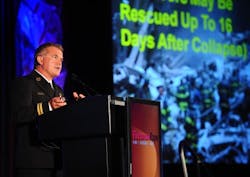Follow additional coverage at Firehouse Expo 2010.
"It was a humbling experience to be there," he said. "It was a proud day for the fire service not just here, but worldwide."
Collins was part of a USAR Task Force that was contacted within thirty minutes after the 7.0-magnitude earthquake hit the country.
Approximately 150 trapped survivors were rescued by international USAR task forces with his team lending a hand in at least 50 of them.
More than 20 nations responded to the incident that claimed the lives of close to 300,000 people.
"This was an unprecedented event, which received an unprecedented response."
He said that while the incident in Haiti was a unique one, the lessons learned can be applied to disasters that occur in the U.S.
"When a U.S. city is flattened, we need to be prepared to roll around the clock like this and accept international assistance," he said.
When Collins' USAR task force first arrived, he said the extent of the destruction was overwhelming.
"The closer you looked, the more collapses you saw," he said. "You could not count them all."
"After a while, your eyes become numb to the number of collapses."
While most people would not know where to begin, training took over and the team was prepared to respond to the catastrophe.
"The fortunate thing is that we did have a systematic approach and knew where to start," he said.
They didn't have the luxury of 70-person search teams and had little time to get in and get out.
"Hasty searches were the method of the day," Collins said. "You couldn't spend too much time on one because there was another waiting down the street."
The rescuers were able to scope out where people were trapped just by observing their surroundings.
"One of the best things we could do is find a place where civilians who were already digging and ask what they were digging for," he said.
They worked quickly, and with limited light at night, they attempted to limit searches to the daytime and finish live rescues at night.
To everyone's surprise, people were still being found alive in void spaces beneath the rubble close to two weeks later.
"We need to be the ones who say, 'Until we have made every opportunity to find survivors, we will work 24 hours straight until we are done searching.' "
He said that despite the destruction that surrounded them, the country's people helped crews in away way they could and assisted in rescue efforts.
"The spirit of the people of Haiti was evident throughout," he said. "The fire service stepped up on this one and the Haitian people were very grateful."
About the Author
Paul Peluso
Staff Writer
Paul Peluso is a Firehouse.com staff writer and has worked for the Web site since 2006. Previously, he worked as a reporter for several community newspapers located in the suburbs of Baltimore, Md. Since joining the newsteam, Paul has covered various fire service issues including fire sprinklers, grants, line of duty deaths and technology. While he started out at the Beltsville, Md. office, he has since moved to Florida where he works out of his home office in Tampa.

